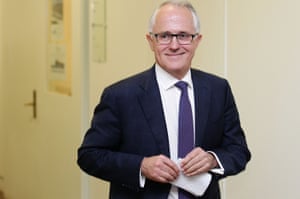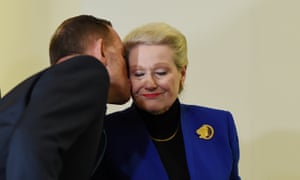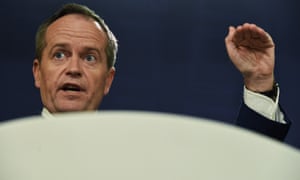Extract from The Guardian
An often calamitous 12 months was marked by ‘wars’
on everything, a notorious knighthood and $5,000 helicopter ride –
and, finally, a switch in leadership
Malcolm Turnbull on the day he won the Liberal
leadership, ensuring he became prime minister. Three months on, the
new prime minister is still covering an absence of clear policy
change with reassuring rhetoric. Photograph: Stefan Postles/Getty
Images
Contact author
Friday 18 December 2015 14.30 AEDT
He said what the country wanted to hear, standing
in a courtyard on a spring afternoon and politely launching a coup.
He promised to “respect the intelligence of the
Australian people”, to end the three-word slogans and instead
advocate and explain policies he believed in.
But Malcolm Turnbull’s great dilemma was obvious
as soon as he became prime minister. The public liked him for
promising to be different, but many of his colleagues only voted for
him because he told them he’d be pretty much the same.
A
day later I wrote: “If he can’t begin to resolve this dilemma
quickly, Turnbull’s perceived authenticity – the view that he is
a man true to his convictions, a different kind of politician –
could quickly turn into a perception that he is an opportunistic
fake, just more of the same.”
Three months on, the new prime minister is still
covering an absence of clear policy change with reassuring rhetoric.
Tony Abbott’s aggression and vitriol has been replaced by
Turnbull’s enthusiasm for pretty much everything and general glee
at being alive at this time.
The lack of actual policy difference – other
than very easy moves like cancelling
Aussie knights and dames and not
reappointing climate sceptic Maurice Newman as his business adviser
– has not yet hurt the new prime minister’s standing in the
opinion polls too much.
The public were apparently so weary of Tony
Abbott’s “wars” on everything they are still just happy the
former prime minister has (almost) gone away. For Labor, and
political observers both on the left and the far right, the fact that
Turnbull is “getting away with it”, as in not changing very much,
is a source of intense frustration.
Tony Abbott with former Speaker Bronwyn Bishop
after a party room meeting to elect her replacement at Parliament
House in Canberra in August. A month later the same party room would
vote Abbott out of office. Photograph: Lukas Coch/AAP
Looking back at the year in politics, it’s
understandable that many voters just wanted the shouting to stop. But
looking at what Turnbull has done suggests that unless he risks
upsetting his right wing detractors with clear and substantial
change, disillusionment could spread.
And a quick look back at what happened to Kevin
Rudd’s popularity ratings after he shelved his policy on “the
greatest moral challenge of our times” shows what happens to
politicians who inspire confidence and are then perceived to be
fakes.
Let’s start with the year – a sorry, mixed-up
calamitous thing even by the standards of recent Australian political
history.
Even before we’d finished the last Christmas
break Abbott had plumbed new levels of ill-judgment by knighting
Prince Philip. Then the year careered through a leadership spill
motion with no challenger, the declaration
that good government was about to begin, a place-holder budget
with the main aim of cleaning up some of the mess left by the
soak-the-poor budget the year before and
a distorted intergenerational report to give the false impression
that the government was doing something about its self-declared
budget emergency.
There were “wars” on anyone who criticised –
from
the ABC, to human
rights commission president Gillian Triggs, to
conservation groups with the temerity to take action under federal
conservation law, to the
climate change authority for calling out the ridiculous misuse of
figures.
Bill Shorten was suffering a crisis of confidence
even when trouncing Tony Abbott in the polls. Photograph: Mick
Tsikas/AAP
There was the constant drumbeat of fear,
amplifying legitimate debate about national security and the horrors
occurring in Syria and Iraq with warnings about imminent domestic
threats, and endless legal “crackdowns”, often
briefed to the Daily Telegraph before the cabinet.
And at the end, hovering
over it all, was a helicopter ride – $5,000 for the speaker to
travel just 80 kilometres – which became emblematic of the
dysfunction and hubris.
But three months after Turnbull swept the Abbott
era away with promises to respect voters’ intelligence and elevate
facts over ideology, few of Abbott’s policies have been explicitly
abandoned and most of Turnbull’s new priorities are still
part-heard.
- The December budget update punctured the optimistic talk with the reality that the budget deficit had grown by $26bn since May. It paid its way – new spending was offset by cuts. But it still included almost $14bn in “savings” from Tony Abbott’s first budget that have been rejected by the senate and the electorate – including the higher education reforms and the revamped, and for the most part re-rejected, cuts to payments for low income families. It’s unclear whether that means Turnbull intends to take them to the next election or whether he just wasn’t ready to wear the headline deficit blowout number if he conceded they were dead. It’s even more unclear how he intends to pay for already-committed spending, for example on the national disability insurance scheme, when his treasurer Scott Morrison claims the nation has no revenue problem and the overall tax take will not rise. The publication of the tax details of 1,500 companies would suggest a pretty big revenue problem and the potential for a substantially higher tax take, just by enforcing existing law or closing deduction loopholes.
Few of
Abbott’s policies have been explicitly abandoned and most of
Turnbull’s new priorities are still part-heard
- Everything – including closing business and superannuation tax concessions – is “back on the table” in the tax debate, which means the table is both laden and kind of messy. It is unclear whether the government is actually intending to raise or broaden the GST, and the November Coag meeting ended in confusion. It has to be resolved by next March, along with the related, and electorally crucial decisions about long term funding for health and education.
- The innovation statement was a clear indication of priority, but the lack of money meant it couldn’t even repair previous cuts to higher education and research and development
- The war on renewable energy has ended, but this has not been admitted out loud. Most changes have been presented as a result of the views of the senate rather than as a conscious change in direction – for example the retention of the Australian renewable energy agency and the clean energy finance corporation. Turnbull’s peace deal with his party means he has to retain Direct Action, even though everyone knows he will have to revise it after the election to meet the targets taken to Paris, either by triggering its internal mechanism to become a baseline and credit emissions trading scheme or introducing some other form of carbon price. The foreign minister, Julie Bishop, said the Paris agreement gave some comfort to the idea that Australia could do more. The climate sceptic right in her party recited their old and increasingly ludicrous lines about getting ahead of the world on an issue that might not even turn out to be much of a thing. Sometime soon, Turnbull will have to confront the reality that climate sceptics have a right to their views but cannot be allowed to drive a the Coalition’s climate policy if it is to be based on an acceptance of the science of climate change. In the meantime his policy is delusional.
- Turnbull brought a welcome end to the overhyping of the national security threat and the generalising about Islam, but Tony Abbott’s citizenship laws were passed virtually unchanged, despite strong advice they could be unconstitutional. Now Abbott’s acolytes on the right are on the warpath because the head of Asio has been doing his job.
- He retained Abbott’s policy of holding a plebiscite on same-sex marriage after the election, even though he argued against it in Abbott’s cabinet. He has yet to decide whether to pass legislation before the election, which would come into force with the successful passage of the plebiscite.
- He ditched Abbott’s ideological ban on federal funding of public transport, but Turnbull’s “cities agenda” – policies to make big cities more functional and liveable – is still a work in progress, as are ideas to leverage more private financing for big infrastructure projects.
Meanwhile, Bill
Shorten, already suffering a crisis of confidence when he was
trouncing Tony Abbott in the polls, struggles on each day, telling
himself Turnbull’s honeymoon will end, but not daring to provide
much policy detail of his own. Labor is backing him with grim
determination since it has almost impenetrable procedural impediments
to making changes. The new moderate face of the Greens, Richard di
Natale is nipping at Labor’s left flank.
Some in the coalition are pressing Turnbull to go
to an early election, to get a mandate for his own agenda and cash in
his soaring poll majority. His inclination appears to be to earn a
mandate by doing.But the mandate he sought when he launched his
challenge did not mention tip-toeing around the right or incremental
reforms by stealth while hoping his internal critics wouldn’t
notice. It promised clarity of purpose and the politics of
conviction.
Surely Turnbull has the political capital right
now, with sky-high polling heading into an election year, to take on
fringe views about national security or climate change or same-sex
marriage or the appropriate way to find money in the budget for
things on which most agree we need to spend money. If he can’t take
on the snipers from the conservative right now, when the polls so
clearly show what voters think is rational and mainstream and their
arguments are so easily defeated with facts – when will he be able
to?
Voters might be happy that this year the nation’s
political discord isn’t following them to the switch-off season at
the beach, but in the new year they’ll be looking for clear
evidence the new prime minister is different in substance from the
regime he replaced.



No comments:
Post a Comment